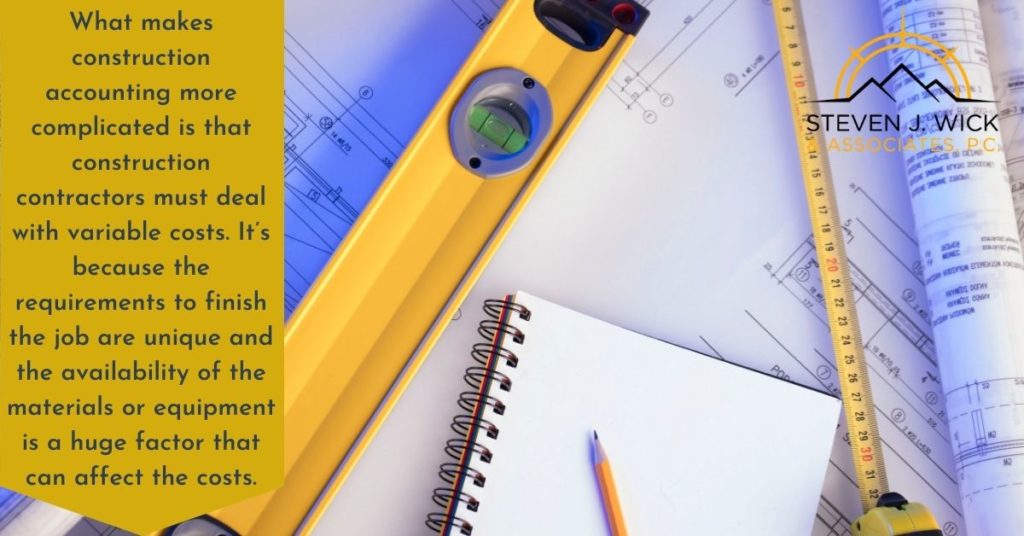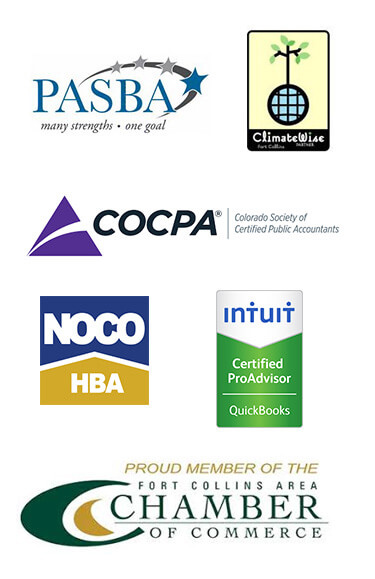Subcontractor
Do you think you can start running your construction business in Fort Collins without a construction accounting consultant around? Think again. The whole enterprise may seem easy for you but there is more to this business than meets the eye. Are you prepared to deal with the unpredictable market prices of construction materials and what it means for your projections? Not only are the prices unpredictable, but the changes can happen so fast that you may be trapped in a contract that leaves your business on the losing end.
You do business to make a profit, but the construction industry is far from straightforward. If your knowledge about the legal and accounting side of the industry is limited, you could only be doing it to break even, if not lose money. All your hard-earned money might be going down the drain and you aren’t even aware!
Whether you are a new entrepreneur in the construction or construction subcontracting business, or a seasoned professional, starting with a construction accounting consultant in your team would be a smart idea.
Why? Accounting consultant Steven Wick of SJ Wick & Associates confirms: “It’s a different animal.” Compared to other industries, there is more at stake and the financial risks are higher considering the system, costing, legal liabilities, and accounting process. While the construction business seems to promise big returns, the inconsistency of market prices could be putting your business in jeopardy. And this is the reason why an accounting expert’s point of view is necessary.

What Are the Roles and Responsibilities of a Construction Contractor and Subcontractor/General Subcontractor?
There’s a difference between a subcontractor and a contractor in terms of the construction industry. Operating under a contract, contractors or general contractors are directly hired by a company or person to deliver work or services is called a contractor. Their responsibilities include planning, executing, supervising, and inspecting a construction project within a certain timeframe. Typically, contractors bring their own crew to complete a certain project or hire subcontractors for specific tasks under a subcontract.
Subcontractors on the other hand also perform labor and services but they are directly hired. Electricians and plumbers are examples of subcontractors the contractor may hire to work on a residential building project. They are hired for their expertise in a specific aspect. Subcontractors do not always belong in big firms but are often individuals.
Both contractors and subcontractors can be categorized under project executive. The contractor may perform a few administrative roles, but they are often not actively involved in clerical and accounting work.
Why This Difference Is Important in Construction Accounting

Looking at the difference, subcontractors have fewer accounting complexities than general contractors. This doesn’t discredit the complexities of accounting in the industry as a whole, but they have fewer moving parts they may need to keep their eye on.
While subcontractors can relax and wait for payday, general contractors still have a variety of issues to deal with – project timeline, costs of materials, fluctuating operating costs, overhead expenses, needed manpower, and even salaries.
Realizing these differences, entrepreneurs in the construction industry are aware of the importance of a precise accounting system, and that having an expert construction accounting consultant will help them survive the complexities of the trade. Aside from that, you can make a sound forecast and better control your company’s expenditures based on market trends.
Is There a Difference Between Accounting for Construction Contractors vs Regular Businesses?
Other businesses in the retail, manufacturing, and service industry use regular accounting principles. Their books can clearly represent their operating costs, profits, assets, and liabilities. The products or services they offer are fixed at fixed prices. Construction businesses, on the other hand, have different issues to deal with.
What Makes Construction Accounting More Challenging Than Other Business Models

Generally, the level of accounting depends on the size of a business. A company with five members would be easier to handle than a company of 50. The more employees you have, the more layers you have and the more diverse your business becomes. But what makes construction accounting more complicated is that construction contractors must deal with variable costs. It’s because the requirements to finish the job are unique and the availability of the materials or equipment is a huge factor that can affect the costs.
A typical construction contract indicates the price of the entire project. Since the prices of construction materials can easily change due to several economic factors, a contractor must quickly acquire these materials in order to prevent a huge loss. Also, a construction company needs a systematic accounting approach to keep track of its expenses. It’s a major concern that makes construction accounting & financial management valuable even for start-ups.
Factors that Weigh in on the Complexity of Accounting for Construction Company
The construction service industry has a more complex day-to-day accounting that affects its long-term goals. For example, an electrical contractor just won the bidding for a brand-new house. The contract states that you can only bill $50,000, including the retention fee.
You can ask for a 50% down payment and the rest will be paid when the job is completed. This could pose a problem for the contractor if the prices of the materials have gone up from the time of the bidding. As a result, the expenditures could become higher than the amount for which you can bill the client.
On another note, let’s say you were initially paid $30,000. This money will then be used for the procurement of construction materials. Until you have the product on hand, you have a “billing in excess of cost” to handle. This kind of arrangement slows down the profit. You will eventually make the money, but not fast enough.
Let’s say you can bill the client every 20th of the month and hopefully get paid on the 10th of the following month. That means there’s another 20-day wait in between, and by that time, the expenses have built up until you can bill the client again. That’s potentially another 50 days of the cost that you have to bear!
Back in 2018 when there was no COVID to worry about, contractors could simply dial in the cost. But times have changed. “Contractors can do all the planning they want, but it would put them and the builder behind if they can’t get the materials to do the job, and this is true, especially during the past couple of years,” says Steve.
How COVID-19 Affects Subcontractor Industry
The COVID-19 pandemic made a significant impact on the global economy. Many businesses were forced to close, if not lay off many of their employees in order to continue operating. The construction industry was not spared, too. While building projects may have boomed in Colorado and other states, the cost of the materials went as much as four times higher than pre-COVID prices.
This was a huge problem for many contractors because their contracts limited them from going beyond the agreed project cost. Many projects were put on hold or canceled. Currently, the ongoing crisis is tough for contractors because the market prices are still unpredictable. However, the easing of restrictions provided some relief and some projects are resuming.
The Key Takeaways
Accounting for construction contractors is challenging because you can’t just make a solid forecast. If you make financial projections without watching your expenditures, money management issues will arise. A typical house, for example, takes six to nine months to build. The billing intervals are long enough for your allotted funds to run out. You might end up getting loans to make up for the financial deficiency. Looking at the big picture, the risk is huge without a proper construction accountant.

Knowing all this, a construction accounting consultant in Fort Collins plays an important role in keeping your finances on track amid the unpredictability of the construction industry. Expert accounting services for construction companies can offer reliable forecasts, which are important for creating your long-term goals. In an uncertain industry, a construction accounting consultant will give your business clarity and reel you in the right direction.
How Can a Specialized, Construction Accounting Consultant Help Your Construction Contracting Business?
According to Steve, “Accounting is a very significant piece of running a business. Think of the financials in the accounting that you have as a business owner as a measurement tool. Understand it and things will be a lot better.”
Your experience in the construction industry isn’t enough to make up for debts and financial loss from not knowing or understanding your accounting. This is a whole different aspect of the trade that only an expert can understand and use to advance your business. Hiring a construction accounting consultant for your Fort Collins business is worth the investment, as you will have a clearer picture of where your company is going.
A construction accounting consultant will be beneficial for your small construction business in Fort Collins in terms of financial management. What Steven J. Wick & Associates, P.C. does is look over the client’s documents. The team thoroughly assesses all the financial information in order to come up with a set of business plans and goals.
The team also looks at the client’s whole system and identifies the areas that need work. Each business has a different set of problems or issues that they need to deal with in order to keep the company going. “We talk about those things in our strategy sessions and figure out how much time we spend in these areas,” Steve says. Along with that, he identifies 5-7 members who are business persons that a contractor needs to follow to keep up with the numbers on a daily basis.”
If you are looking for an accountant specializing in the construction industry, Steven J Wick and Associates, P.C. is here to help. Call today so we can start constructing your business goals!
Subcontractor
Do you think you can start running your construction business in Fort Collins without a construction accounting consultant around? Think again. The whole enterprise may seem easy for you but there is more to this business than meets the eye. Are you prepared to deal with the unpredictable market prices of construction materials and what it means for your projections? Not only are the prices unpredictable, but the changes can happen so fast that you may be trapped in a contract that leaves your business on the losing end.
You do business to make a profit, but the construction industry is far from straightforward. If your knowledge about the legal and accounting side of the industry is limited, you could only be doing it to break even, if not lose money. All your hard-earned money might be going down the drain and you aren’t even aware!
Whether you are a new entrepreneur in the construction or construction subcontracting business, or a seasoned professional, starting with a construction accounting consultant in your team would be a smart idea.
Why? Accounting consultant Steven Wick of SJ Wick & Associates confirms: “It’s a different animal.” Compared to other industries, there is more at stake and the financial risks are higher considering the system, costing, legal liabilities, and accounting process. While the construction business seems to promise big returns, the inconsistency of market prices could be putting your business in jeopardy. And this is the reason why an accounting expert’s point of view is necessary.

What Are the Roles and Responsibilities of a Construction Contractor and Subcontractor/General Subcontractor?
There’s a difference between a subcontractor and a contractor in terms of the construction industry. Operating under a contract, contractors or general contractors are directly hired by a company or person to deliver work or services is called a contractor. Their responsibilities include planning, executing, supervising, and inspecting a construction project within a certain timeframe. Typically, contractors bring their own crew to complete a certain project or hire subcontractors for specific tasks under a subcontract.
Subcontractors on the other hand also perform labor and services but they are directly hired. Electricians and plumbers are examples of subcontractors the contractor may hire to work on a residential building project. They are hired for their expertise in a specific aspect. Subcontractors do not always belong in big firms but are often individuals.
Both contractors and subcontractors can be categorized under project executive. The contractor may perform a few administrative roles, but they are often not actively involved in clerical and accounting work.
Why This Difference Is Important in Construction Accounting

Looking at the difference, subcontractors have fewer accounting complexities than general contractors. This doesn’t discredit the complexities of accounting in the industry as a whole, but they have fewer moving parts they may need to keep their eye on.
While subcontractors can relax and wait for payday, general contractors still have a variety of issues to deal with – project timeline, costs of materials, fluctuating operating costs, overhead expenses, needed manpower, and even salaries.
Realizing these differences, entrepreneurs in the construction industry are aware of the importance of a precise accounting system, and that having an expert construction accounting consultant will help them survive the complexities of the trade. Aside from that, you can make a sound forecast and better control your company’s expenditures based on market trends.
Is There a Difference Between Accounting for Construction Contractors vs Regular Businesses?
Other businesses in the retail, manufacturing, and service industry use regular accounting principles. Their books can clearly represent their operating costs, profits, assets, and liabilities. The products or services they offer are fixed at fixed prices. Construction businesses, on the other hand, have different issues to deal with.
What Makes Construction Accounting More Challenging Than Other Business Models

Generally, the level of accounting depends on the size of a business. A company with five members would be easier to handle than a company of 50. The more employees you have, the more layers you have and the more diverse your business becomes. But what makes construction accounting more complicated is that construction contractors must deal with variable costs. It’s because the requirements to finish the job are unique and the availability of the materials or equipment is a huge factor that can affect the costs.
A typical construction contract indicates the price of the entire project. Since the prices of construction materials can easily change due to several economic factors, a contractor must quickly acquire these materials in order to prevent a huge loss. Also, a construction company needs a systematic accounting approach to keep track of its expenses. It’s a major concern that makes construction accounting & financial management valuable even for start-ups.
Factors that Weigh in on the Complexity of Accounting for Construction Company
The construction service industry has a more complex day-to-day accounting that affects its long-term goals. For example, an electrical contractor just won the bidding for a brand-new house. The contract states that you can only bill $50,000, including the retention fee.
You can ask for a 50% down payment and the rest will be paid when the job is completed. This could pose a problem for the contractor if the prices of the materials have gone up from the time of the bidding. As a result, the expenditures could become higher than the amount for which you can bill the client.
On another note, let’s say you were initially paid $30,000. This money will then be used for the procurement of construction materials. Until you have the product on hand, you have a “billing in excess of cost” to handle. This kind of arrangement slows down the profit. You will eventually make the money, but not fast enough.
Let’s say you can bill the client every 20th of the month and hopefully get paid on the 10th of the following month. That means there’s another 20-day wait in between, and by that time, the expenses have built up until you can bill the client again. That’s potentially another 50 days of the cost that you have to bear!
Back in 2018 when there was no COVID to worry about, contractors could simply dial in the cost. But times have changed. “Contractors can do all the planning they want, but it would put them and the builder behind if they can’t get the materials to do the job, and this is true, especially during the past couple of years,” says Steve.
How COVID-19 Affects Subcontractor Industry
The COVID-19 pandemic made a significant impact on the global economy. Many businesses were forced to close, if not lay off many of their employees in order to continue operating. The construction industry was not spared, too. While building projects may have boomed in Colorado and other states, the cost of the materials went as much as four times higher than pre-COVID prices.
This was a huge problem for many contractors because their contracts limited them from going beyond the agreed project cost. Many projects were put on hold or canceled. Currently, the ongoing crisis is tough for contractors because the market prices are still unpredictable. However, the easing of restrictions provided some relief and some projects are resuming.
The Key Takeaways
Accounting for construction contractors is challenging because you can’t just make a solid forecast. If you make financial projections without watching your expenditures, money management issues will arise. A typical house, for example, takes six to nine months to build. The billing intervals are long enough for your allotted funds to run out. You might end up getting loans to make up for the financial deficiency. Looking at the big picture, the risk is huge without a proper construction accountant.

Knowing all this, a construction accounting consultant in Fort Collins plays an important role in keeping your finances on track amid the unpredictability of the construction industry. Expert accounting services for construction companies can offer reliable forecasts, which are important for creating your long-term goals. In an uncertain industry, a construction accounting consultant will give your business clarity and reel you in the right direction.
How Can a Specialized, Construction Accounting Consultant Help Your Construction Contracting Business?
According to Steve, “Accounting is a very significant piece of running a business. Think of the financials in the accounting that you have as a business owner as a measurement tool. Understand it and things will be a lot better.”
Your experience in the construction industry isn’t enough to make up for debts and financial loss from not knowing or understanding your accounting. This is a whole different aspect of the trade that only an expert can understand and use to advance your business. Hiring a construction accounting consultant for your Fort Collins business is worth the investment, as you will have a clearer picture of where your company is going.
A construction accounting consultant will be beneficial for your small construction business in Fort Collins in terms of financial management. What Steven J. Wick & Associates, P.C. does is look over the client’s documents. The team thoroughly assesses all the financial information in order to come up with a set of business plans and goals.
The team also looks at the client’s whole system and identifies the areas that need work. Each business has a different set of problems or issues that they need to deal with in order to keep the company going. “We talk about those things in our strategy sessions and figure out how much time we spend in these areas,” Steve says. Along with that, he identifies 5-7 members who are business persons that a contractor needs to follow to keep up with the numbers on a daily basis.”
If you are looking for an accountant specializing in the construction industry, Steven J Wick and Associates, P.C. is here to help. Call today so we can start constructing your business goals!
Subcontractor
Do you think you can start running your construction business in Fort Collins without a construction accounting consultant around? Think again. The whole enterprise may seem easy for you but there is more to this business than meets the eye. Are you prepared to deal with the unpredictable market prices of construction materials and what it means for your projections? Not only are the prices unpredictable, but the changes can happen so fast that you may be trapped in a contract that leaves your business on the losing end.
You do business to make a profit, but the construction industry is far from straightforward. If your knowledge about the legal and accounting side of the industry is limited, you could only be doing it to break even, if not lose money. All your hard-earned money might be going down the drain and you aren’t even aware!
Whether you are a new entrepreneur in the construction or construction subcontracting business, or a seasoned professional, starting with a construction accounting consultant in your team would be a smart idea.
Why? Accounting consultant Steven Wick of SJ Wick & Associates confirms: “It’s a different animal.” Compared to other industries, there is more at stake and the financial risks are higher considering the system, costing, legal liabilities, and accounting process. While the construction business seems to promise big returns, the inconsistency of market prices could be putting your business in jeopardy. And this is the reason why an accounting expert’s point of view is necessary.

What Are the Roles and Responsibilities of a Construction Contractor and Subcontractor/General Subcontractor?
There’s a difference between a subcontractor and a contractor in terms of the construction industry. Operating under a contract, contractors or general contractors are directly hired by a company or person to deliver work or services is called a contractor. Their responsibilities include planning, executing, supervising, and inspecting a construction project within a certain timeframe. Typically, contractors bring their own crew to complete a certain project or hire subcontractors for specific tasks under a subcontract.
Subcontractors on the other hand also perform labor and services but they are directly hired. Electricians and plumbers are examples of subcontractors the contractor may hire to work on a residential building project. They are hired for their expertise in a specific aspect. Subcontractors do not always belong in big firms but are often individuals.
Both contractors and subcontractors can be categorized under project executive. The contractor may perform a few administrative roles, but they are often not actively involved in clerical and accounting work.
Why This Difference Is Important in Construction Accounting

Looking at the difference, subcontractors have fewer accounting complexities than general contractors. This doesn’t discredit the complexities of accounting in the industry as a whole, but they have fewer moving parts they may need to keep their eye on.
While subcontractors can relax and wait for payday, general contractors still have a variety of issues to deal with – project timeline, costs of materials, fluctuating operating costs, overhead expenses, needed manpower, and even salaries.
Realizing these differences, entrepreneurs in the construction industry are aware of the importance of a precise accounting system, and that having an expert construction accounting consultant will help them survive the complexities of the trade. Aside from that, you can make a sound forecast and better control your company’s expenditures based on market trends.
Is There a Difference Between Accounting for Construction Contractors vs Regular Businesses?
Other businesses in the retail, manufacturing, and service industry use regular accounting principles. Their books can clearly represent their operating costs, profits, assets, and liabilities. The products or services they offer are fixed at fixed prices. Construction businesses, on the other hand, have different issues to deal with.
What Makes Construction Accounting More Challenging Than Other Business Models

Generally, the level of accounting depends on the size of a business. A company with five members would be easier to handle than a company of 50. The more employees you have, the more layers you have and the more diverse your business becomes. But what makes construction accounting more complicated is that construction contractors must deal with variable costs. It’s because the requirements to finish the job are unique and the availability of the materials or equipment is a huge factor that can affect the costs.
A typical construction contract indicates the price of the entire project. Since the prices of construction materials can easily change due to several economic factors, a contractor must quickly acquire these materials in order to prevent a huge loss. Also, a construction company needs a systematic accounting approach to keep track of its expenses. It’s a major concern that makes construction accounting & financial management valuable even for start-ups.
Factors that Weigh in on the Complexity of Accounting for Construction Company
The construction service industry has a more complex day-to-day accounting that affects its long-term goals. For example, an electrical contractor just won the bidding for a brand-new house. The contract states that you can only bill $50,000, including the retention fee.
You can ask for a 50% down payment and the rest will be paid when the job is completed. This could pose a problem for the contractor if the prices of the materials have gone up from the time of the bidding. As a result, the expenditures could become higher than the amount for which you can bill the client.
On another note, let’s say you were initially paid $30,000. This money will then be used for the procurement of construction materials. Until you have the product on hand, you have a “billing in excess of cost” to handle. This kind of arrangement slows down the profit. You will eventually make the money, but not fast enough.
Let’s say you can bill the client every 20th of the month and hopefully get paid on the 10th of the following month. That means there’s another 20-day wait in between, and by that time, the expenses have built up until you can bill the client again. That’s potentially another 50 days of the cost that you have to bear!
Back in 2018 when there was no COVID to worry about, contractors could simply dial in the cost. But times have changed. “Contractors can do all the planning they want, but it would put them and the builder behind if they can’t get the materials to do the job, and this is true, especially during the past couple of years,” says Steve.
How COVID-19 Affects Subcontractor Industry
The COVID-19 pandemic made a significant impact on the global economy. Many businesses were forced to close, if not lay off many of their employees in order to continue operating. The construction industry was not spared, too. While building projects may have boomed in Colorado and other states, the cost of the materials went as much as four times higher than pre-COVID prices.
This was a huge problem for many contractors because their contracts limited them from going beyond the agreed project cost. Many projects were put on hold or canceled. Currently, the ongoing crisis is tough for contractors because the market prices are still unpredictable. However, the easing of restrictions provided some relief and some projects are resuming.
The Key Takeaways
Accounting for construction contractors is challenging because you can’t just make a solid forecast. If you make financial projections without watching your expenditures, money management issues will arise. A typical house, for example, takes six to nine months to build. The billing intervals are long enough for your allotted funds to run out. You might end up getting loans to make up for the financial deficiency. Looking at the big picture, the risk is huge without a proper construction accountant.

Knowing all this, a construction accounting consultant in Fort Collins plays an important role in keeping your finances on track amid the unpredictability of the construction industry. Expert accounting services for construction companies can offer reliable forecasts, which are important for creating your long-term goals. In an uncertain industry, a construction accounting consultant will give your business clarity and reel you in the right direction.
How Can a Specialized, Construction Accounting Consultant Help Your Construction Contracting Business?
According to Steve, “Accounting is a very significant piece of running a business. Think of the financials in the accounting that you have as a business owner as a measurement tool. Understand it and things will be a lot better.”
Your experience in the construction industry isn’t enough to make up for debts and financial loss from not knowing or understanding your accounting. This is a whole different aspect of the trade that only an expert can understand and use to advance your business. Hiring a construction accounting consultant for your Fort Collins business is worth the investment, as you will have a clearer picture of where your company is going.
A construction accounting consultant will be beneficial for your small construction business in Fort Collins in terms of financial management. What Steven J. Wick & Associates, P.C. does is look over the client’s documents. The team thoroughly assesses all the financial information in order to come up with a set of business plans and goals.
The team also looks at the client’s whole system and identifies the areas that need work. Each business has a different set of problems or issues that they need to deal with in order to keep the company going. “We talk about those things in our strategy sessions and figure out how much time we spend in these areas,” Steve says. Along with that, he identifies 5-7 members who are business persons that a contractor needs to follow to keep up with the numbers on a daily basis.”
If you are looking for an accountant specializing in the construction industry, Steven J Wick and Associates, P.C. is here to help. Call today so we can start constructing your business goals!




